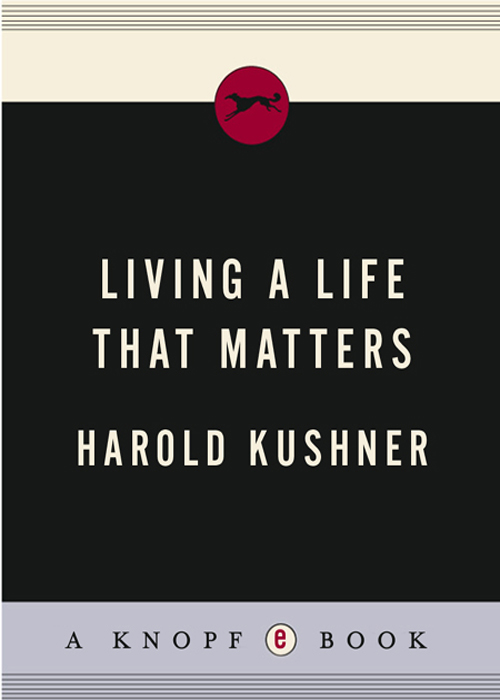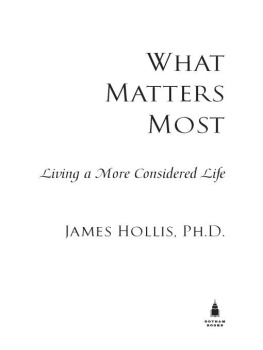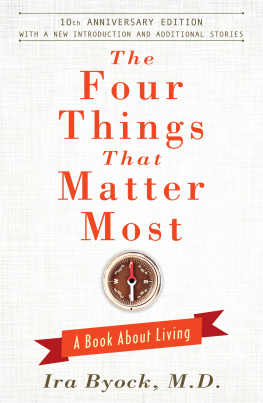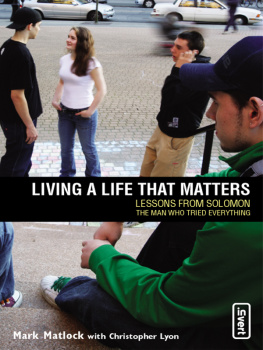
Living aLife
That Matters

HAROLD S.KUSHNER

ANCHOR BOOKS
ADIVISION OF RANDOM HOUSE, INC.
NEWYORK

Contents
For Chila Sara Haber
The new century is yours. May you see the world
ofyour dreams realized in your lifetime.

FIRST WORDS
I believe in you. I believethat you have the ability to do great things, things that will change the worldfor the better. In fact, you may already have done some thingschoicesyou have made, people you have reached out tothat can have bigconsequences, and you deserve to know that. That is why I have written thisbook.
Though the book bears only my name on its cover as the author,it is the product of many minds and hands. I have said in previous books howfortunate I have been to have James H. Silberman as my editor. I should addthat I believe you, the readers, are equally fortunate that Jim has been myeditor. Every page of this book has benefited from his insights and hisadvice.
Jonathan Segal cast a wise and experienced eye on themanuscript, and I thank him for it.
Once again, my very able agent,Peter Ginsberg of Curtis Brown Ltd., has been the matchmaker, and I remaindeeply grateful to him for that. My wife, Suzette, has been unfailinglysupportive when the writing was going well and patient and encouraging when itwas going less well. A number of good friends helped me to think through theideas of this book, and I thank them, too.
Finally, I have dedicatedthis book to my four-year-old granddaughter, Chila. My two previous books werededicated to her parents and to her older brother; now it is her turn.Moreover, because she is a second child, Its my turn wereamong Chilas first words, which fits in perfectly with the theme of thisbook, the human need to know that we are important and that the world takes usseriously. May this book underscore her importance and that of every one ofyou.
CHAPTER1

The Two Voices ofGod
Like many people, I live in two worlds. Much of the time, Ilive in the world of work and commerce, eating, working, and paying my bills.It is a world that honors people for being attractive and productive. Itreveres winners and scorns losers, as reflected in its treatment of devotedpublic servants who lose an election or in the billboard displayed at theAtlanta Olympic Games a few years ago: You dont win the silvermedal, you lose the gold. As in most contests, there are many morelosers than winners, so most of the citizens of that world spend a lot of timeworrying that they dont measure up.
But, fortunately, there isanother world where, even before I entered it professionally, I have spent someof my time. As a religiously committed person, I live in the world of faith,the world of the spirit. Its heroes are models of compassion rather thancompetition. In that world, you win through sacrifice and self-restraint. Youwin by helping your neighbor and sharing with him rather than by finding hisweakness and defeating him. And in the world of the spirit, there are many morewinners than losers.
When I was young, most of my time and energy weredevoted to the world of getting and spending. I relished competition. I wantedto be challenged. How else could I find out how good I was, where I stood onthe ladder of winners and losers? I was living out the insight of thepsychoanalyst Carl Jung that act one of a young mans life is thestory of his setting out to conquer the world.
Of course, I wasnot the only person who did that. Most people lived as I did. For severalyears, our next-door neighbors son was a nationally renownedprofessional athlete. It wasnt money that kept him playing and riskingserious injury. It was the challenge, the competition, the opportunity to proveonce again that he was better than most people at what he did.
When Iwas young, I saw that second world, the world of faith, as a kind of vacationhome, a place to which I repaired in order to relax from the stress of theworld of striving, so that I could emerge refreshed to resume the battle. Attimes, it seemed almost a mirror image of my first world, a place wheredifferent people played by different rules. Old people were respected there fortheir wisdom and experience, as were old ideas and old values. People weredescribed as beautiful because they exuded compassion andgenerosity rather than wealth and glamour. Success had a verydifferent meaning there.
As my life increasingly became a story ofgiving up dreams and coming to terms with my limitations (Jung went on to say,Act two is the story of a young man realizing that the world is notabout to be conquered by the likes of him), I found myself returningmore and more to that second, alternative world. I would often recall the wordsof my teacher Abraham Joshua Heschel: When I was young, I admired cleverpeople. As I grew old, I came to admire kind people.
Lookingback at my life, I realize that I was commuting between those two worlds in aneffort to meet two basic human needs, the need to feel successful and importantand the need to think of myself as a good person, someone who deserved theapproval of other good people.
We need to know that we matter to theworld, that the world takes us seriously. I read a memoir recently in which awoman recalls staying home from school one day as a child because she was sick.Hearing the noises of the world outside her window, she was dismayed to realizethat the world was going on without her, not even missing her. The woman grewup to be devoutly religious, a pillar of her church, active in manyorganizations, feeding the hungry. As I read her story, I wondered if shebecame an activist to overcome that childhood fear of insignificance, toreassure herself that she did make a difference to the world.
In my forty years as a rabbi, I have tended to many people in the lastmoments of their lives. Most of them were not afraid of dying. Some were oldand felt that they had lived long, satisfying lives. Others were so sick and insuch pain that only death would release them. The people who had the mosttrouble with death were those who felt that they had never done anythingworthwhile in their lives, and if God would only give them another two or threeyears, maybe they would finally get it right. It was not death that frightenedthem; it was insignificance, the fear that they would die and leave no mark onthe world.
The need to feel important drives people to place enormousvalue on such symbols as titles, corner offices, and first-class travel. Itcauses us to feel excessively pleased when someone important recognizes us, andto feel hurt when our doctor or pastor passes us on the street without sayinghello, or when a neighbor calls us by our sisters or brothersname. The need to know that we are making a difference motivates doctors andmedical researchers to spend hours looking through microscopes in the hope offinding cures for diseases. It drives inventors and entrepreneurs to stay upnights trying to find a better way of providing people with something theyneed. It causes artists, novelists, and composers to try to add to the store ofbeauty in the world by finding just the right color, the right word, the rightnote. And it leads ordinary people to buy six copies of the local paper becauseit has their name or picture in it.
Next page






